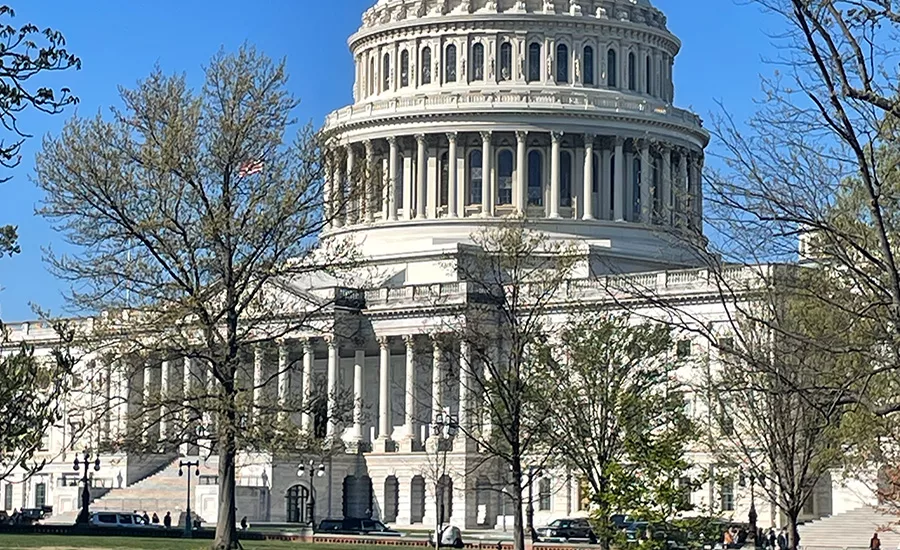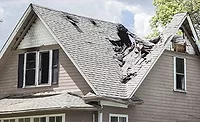Legilsative Dispatch
NRCA 'Roofing Day' Lobby Effort Successful Amid Tariff Chaos
Despite the uncertainty, attendee participation was greater than any time before the COVID-19 pandemic

The National Roofing Contractors Association's annual Roofing Day lobbying event unfolded on the same day that President Trump's reciprocal tariffs were scheduled to take effect. By day's end, the president had relented, issuing a 90-day pause.
Image: Bryan Gottlieb/Roofing Contractor
WASHINGTON, D.C. — This year’s Roofing Day — the annual National Roofing Contractors Association lobbying event that sees industry professionals descend on Capitol Hill — was, by all accounts, a resounding success despite awesome headwinds.
This year, attendance reached numbers not seen since before the COVID-19 pandemic, with approximately 260 members coming to Washington, D.C. — the third-highest attendance ever — splitting into delegations and schooling members of Congress on issues the NRCA has long advocated for.
Of all attendees, a record 90 were first-time participants.
Still, historical markers come in all shapes. Against the attendance smash, the roofing industry pitched to lawmakers on the day President Donald Trump’s “big, beautiful tariffs” came into full bloom.
The days leading up to this year’s event on April 9 were fraught with uncertainty; just six business days earlier, the president announced those “Liberation Day” tariffs.
Within a week, global markets gyrated, shedding accumulated gains in what some economists described as unsurprising but still an anomaly.
RELATED
‘Liberation Day’ Tariffs on Imported Materials Give Roofing Industry the Jitters
The Undercurrent in Context
U.S. stocks slid steeply following Trump’s Liberation Day tariff announcement and continued nearly unabated through the start of Roofing Day on April 9.
According to Reuters, during those seven business days, the S&P 500 lost about 9.1% of its value, the Dow Jones Industrial Average dropped roughly 7.9%, and the Nasdaq composite fell close to 10% — with S&P 500 companies alone shedding nearly $6 trillion in market capitalization in the steepest four‐day decline in decades.
Yet, before the end of trading Wednesday, the president again reversed course, announcing he would pause reciprocal tariffs for 90 days.
It was a rare but welcomed acknowledgment of just how strongly markets are rejecting the president's tariff argument. Stocks soared on the news, with the S&P 500 rising 9.5% — its largest single-day gain since October 2008.
Trump continues holding firm on the escalating trade war with China, raising tariffs on Chinese exports to 125% after Beijing announced a new round of retaliation.
This was the backdrop for which NRCA members called on Congress for increased funding and tax reductions.
Ground Rules
The NRCA permitted Roofing Contractor to embed with various state delegations on the condition that all meetings were “off the record,” meaning we agreed not to directly quote participants during meetings with congressional members or staff — at a minimum, no attribution.
While reporters are typically loath to make accommodations like that, in this instance, we believe the access gained was worth the concession.
* * *
Doug Duncan, current board chairman of the NRCA, welcomed members Tuesday afternoon in what is likely his last official event before stepping down from the chairmanship's one-year term.
While the industry's oldest trade group organizes the event, the advocacy includes broad representation, including contractors, manufacturers and distributors from across the nearly $57 billion industry, according to 2023 Better Business Bureau figures.
Duncan acknowledged the feat of the room's presence and offered gratitude to attendees willing to participate in civic engagement for the benefit of the industry.
“It has been such an exciting year for me personally and in my business life, and the NRCA has just been great,” he said. “I am thrilled to be united here again as we take our priorities to Capitol Hill and share the industry stories.”
Duncan recently left his longstanding role as president of Nations Roof Illinois to join the Roofing Corp. of America platform as its regional president. He will oversee the firm’s western portfolio.
Along with a mix of manufacturers and contractors, Duncan and NRCA staff met with Trump’s Labor Department Secretary, Lori Chavez-DeRemer. Duncan said Chavez-DeRemer was highly receptive to helping the industry resolve its pain points, pointing to NRCA Vice President of Government Relations Duane Musser, asking, "do you see the smile on that man's face?"
In a statement, Musser said participants reported high engagement with staffers and members of Congress alike and that marker of success outstripped any latent tariff concerns.
"Participants successfully [conveyed] this message and were excited to be part of an opportunity to increase the influence of the roofing industry in the halls of Congress," he said, "with the goal of sustaining a more prosperous industry."
 The Illinois delegation met with Rep. Raja Krishnamoorthi (D-IL 08) in one of several meetings with lawmakers during Roofing Day on Wednesday.
The Illinois delegation met with Rep. Raja Krishnamoorthi (D-IL 08) in one of several meetings with lawmakers during Roofing Day on Wednesday.
The Agenda
 The NRCA’s Washington, D.C. government relations team provided attendees a rundown of Wednesday’s agenda, which could be divided into two categories: tax reform and labor shortage solutions.
The NRCA’s Washington, D.C. government relations team provided attendees a rundown of Wednesday’s agenda, which could be divided into two categories: tax reform and labor shortage solutions.
Pro-Growth Tax Reform
The corporate pass-through tax cuts, referred to in the federal tax code as the 199A deduction and enacted in Trump’s first term, are scheduled to sunset at the end of the current calendar year.
Without codifying that fix, the NRCA says Main Street businesses organized as pass-through entities would pay significantly higher taxes, putting them at a competitive disadvantage and accelerating economic consolidation taking place in our economy.
Status: The Main Street Tax Certainty Act, House and Senate versions, H.R. 703 and S. 213, respectively, have been introduced in their respective chambers and are under consideration in the 119th Congress.
* * *
The American Innovation and R&D Competitiveness Act permanently restores businesses' ability to deduct research and development expenses immediately. Currently, domestic companies must amortize those expenditures over five years.
Status: This bill died in the 118th Congress and is awaiting reintroduction for consideration.
* * *
Energy Efficiency Tax Breaks
Maintaining the 179D commercial buildings energy efficiency tax deduction and 45L new energy-efficient home tax credit. The U.S. federal tax code incentivizes energy efficiency in buildings through two provisions:
- Section 179D: Provides tax deductions for owners and designers of commercial buildings that implement energy-efficient systems. Properties must reduce energy costs by at least 25% compared to a benchmark building meeting ASHRAE standards. Deductions start at $0.58 per square foot for 25% improvements and can reach $0.02 per square foot for 54% improvements.
- Section 45L: Offers tax credits to contractors constructing or renovating energy-efficient residential homes. The credits for homes acquired in 2025 are: Single-family and manufactured homes: $2,500 if certified under ENERGY STAR standards. Multifamily homes: $500 per unit for ENERGY STAR-certified homes.
Status: Currently in place.
* * *
Labor Shortage Fixes
Seeking a $70 million increase in funding for Perkins CTE State Grants:
The grants, authorized by the Strengthening Career and Technical Education for the 21st Century Act (Perkins V) of 2018, provide the states with approximately $1.4 billion annually.
These funds enhance CTE programs, equipping students with skills for high-demand careers. States allocate them to eligible secondary and postsecondary institutions based on formulas, promoting academic and technical education integration.
Status: No change.
* * *
Supporting a Stronger Workforce for America Act:
Bipartisan legislation to reform and improve training programs under the Workforce Innovation and Opportunity Act to ensure more job creators and workers can benefit.
Status: This bill was introduced in the House in the 118th Congress but died at the end of 2024. It is awaiting reintroduction.
* * *
Supporting qualified individuals working under Temporary Protected Status and the Deferred Action for Childhood Arrivals, or DACA, program to adjust to lawful permanent status.
DACA is a U.S. policy established in 2012 that offers eligible undocumented individuals who arrived as children temporary protection from deportation and work authorization. Recipients, known as "Dreamers," must meet specific criteria, including continuous residence since June 15, 2007, and arrival before age 16.
DACA does not provide legal status or a path to citizenship but allows for renewable two-year periods of deferred action.
Status: DACA's future remains uncertain due to ongoing legal challenges.
A January 2025 ruling by the Fifth Circuit Court of Appeals deemed the program unlawful but permitted current recipients to continue renewing their status.
* * *
Co-sponsoring the Essential Workers for Economic Advancement Act to establish a visa system that meets the workforce demands of a 21st-century economy.
The Essential Workers for Economic Advancement Act, introduced during the 118th Congress as H.R. 3734, proposes the creation of a new nonimmigrant visa category known as the H-2C visa.
This visa addresses labor shortages by permitting temporary nonagricultural workers to fill positions that have remained unoccupied for a specified duration in areas where the unemployment rate is 7.9% or lower.
The visa targets specific occupations, excluding those requiring a bachelor's degree or higher.
Status: The bill is awaiting consideration for reintroduction in the 119th Congress.
Impressions
While nothing is set to happen immediately, the lawmaker meetings I attended offered clues to what is most likely attainable in the 119th Congress. By far, the consensus was around codifying the 199A deduction for pass-through entities.
Legislators from either side of the aisle expressed support for it. One GOP senator from the Midwest, a former business owner, noted the tax break should have been higher in the original legislation. As of this writing, the House was set to vote on Trump’s budget Wednesday evening.
Quick Read: 5 Takeaways
- Roofing Day 2025 saw a record turnout with 270 attendees, including 90 first-time participants, advocating for industry priorities on Capitol Hill. Amid market volatility triggered by President Trump's tariff announcements,
- NRCA members lobbied for key tax reforms and labor shortage solutions. Pro-growth tax reform remains a focal point, with efforts to preserve the 199A deduction and encourage energy-efficient tax incentives in the industry.
- Solutions for labor shortages include advocating for increased funding for career and technical education programs and visa reforms for essential workers.
- Despite challenges, bipartisan support for tax and immigration reform gives hope for progress in the 119th Congress, with a focus on addressing the roofing industry's needs.
- Regarding immigration, Democratic House and Senate members I spoke with expressed support. Surprisingly, so did many GOP lawmakers, recognizing that the market has already made it clear: if Americans wanted entry-level labor jobs in roofing, those positions would not remain perpetually vacant.
Correction: Roofing Corp of America is not backed by private equity. The story has been updated to reflect this.
Looking for a reprint of this article?
From high-res PDFs to custom plaques, order your copy today!






